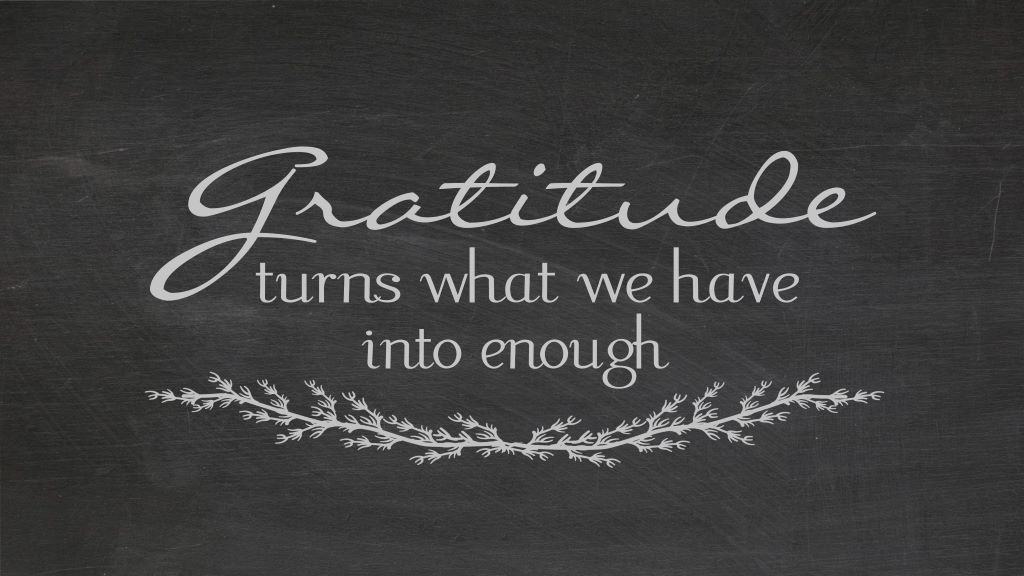Our society seems centered around this idea that we never have enough. We must always strive for more, accumulate more, buy more, and BE more. However, this type of thinking leads to disappointment after a while. That’s because after chasing happiness, we eventually realize it evades us. The solution to this problem lies in gratitude. After all, being grateful for what we have means we don’t need to keep chasing material items or people to satisfy us.
“Gratitude turns what we have into enough.” – Anonymous
The happiest people on Earth express gratitude daily for what they have. They are thankful for the Source of life, friends, family, or coworkers. We’re constantly bombarded with ads on TV and social media telling us our lives will improve if we buy this skincare product or this course to make us more money. Sure, those things might make you happier in the short-term. But, ultimately, long-term happiness comes from within.
Now, science proves that gratitude physically changes your brain. We’ll go over various ways that gratitude improves your health below.
Here’s how gratitude changes your brain to be happier:
In the past, most research studies about gratitude focused on well-functioning people. However, two professors from Indiana University wanted to see how gratitude could influence the brains of those who struggle from various mental disorders.
They did a study involving nearly 300 adults consisting of mostly college students who were in counseling for mental health. The participants reported having poor mental health at the time of the study. Furthermore, the researchers recruited them just before their first counseling session. Most people seeking counseling at this university struggled with issues such as depression and anxiety.
The professors divided the students into three groups. All of them went to counseling services, but only the first group was told to write a letter of gratitude to another person every week for three weeks. The second group was instructed to write about their deepest thoughts and feelings surrounding negative experiences. The third group didn’t journal at all.
The results?
Compared with the second and third groups, the first group who wrote gratitude letters reported much better mental health after their writing exercises ended. This study proves that gratitude letters can help everyone, even those who struggle with severe mental illnesses. In fact, it seems from this study that practicing gratitude, along with counseling services, supports more than psychological help alone.
So, how does gratitude impact the mind and body?
The professors had a few insights on the psychological benefits of gratitude.
1 – Gratitude helps us move past toxic emotions
First, the researchers studied the words used by participants in both of the writing groups so they could understand how gratitude letter writing impacted mental health. They compared the percentage of positive emotions words, negative emotion words, and “we” words (first-person plural words) that participants used in their letters. The professors weren’t surprised to find that the participants in the gratitude letter group used more positive words and more “we” words than the other group.
However, the people who used more positive and “we” words didn’t necessarily have better mental health later on. Only when they used fewer negative words did participants report having improved mental health after the writing exercises ended. In fact, the lack of negative emotion words made the most significant difference in the mental health of those in the gratitude letter writing group. This explained the mental health gap between the negative emotion group and the gratitude letter group.
This suggests that the gratitude letter exercise helps people focus on positive experiences and gratitude toward others, which can help keep the mind from ruminating on past negative experiences with people. When you’re not focused on negative emotions and experiences, it makes it easier to focus on the abundance of positive emotions, you can feel just by shifting your perspective.
2 – Even if you keep it to yourself, gratitude still helps
The professors told the participants in the study that they didn’t have to send their letters to the intended recipients. Only 23% of the participants ended up sending them, but everyone in the group reported having better mental health. This shows that just the act of writing out the letter boosted the mental health of the participants, even if they didn’t intend to send the message.
This shows that you can still feel gratitude even if you don’t communicate it to another person.
You might not send the letter. Just writing out your blessings can help shift your focus away from negative thinking and refresh your mind. However, hearing the other person’s reaction when they read the letter can help both you and the recipient’s mental health, so if you want to try this out yourself, we encourage you to send the letter.
3 – You won’t feel the benefits right away
In the study, researchers found that the participants didn’t report the benefits of the gratitude letters right away. Instead, the gains accumulated over time. Although the three groups had about the same mental health one week after the conclusion of the study, individuals in the gratitude group reported better mental health than the others four weeks after the writing activities, and an even more significant difference 12 weeks after the end of the writing exercises.
These results show how something positive that we experience or engage in, no matter how small, can affect us even weeks afterward. This happens with exercise, healthy eating, meditation, and other healthy habits. Indeed, we typically don’t see the benefits at first but notice them gradually over time.
The researchers don’t know why this positive effect occurred weeks after the experiment. They think that perhaps the participants discussed the gratitude writing exercise with counselors or other people in their lives, which reinforced the positive feelings that the activity promoted.
4 – Gratitude physically changes the brain
This is perhaps the most important finding from the study. Three months after the counseling sessions began, the professors took some of the people from the gratitude writing group and some from the group that didn’t do any writing. They wanted to know if their brains looked any different due to the gratitude exercise (or lack thereof).
They measured their brain activity using an fMRI scanner while participants from each group did a “pay it forward” task. In the exercise, a benefactor regularly gave the participants a small amount of money. This benefactor asked that the participants only pay it forward if they felt grateful. Our participants then decided what percentage of the money, if any, they would donate to a worthy cause. A fun fact: the professors in the study actually did donate the proceeds to a charity.
From the authors of the study:
“We wanted to distinguish donations motivated by gratitude from donations driven by other motivations, like feelings of guilt or obligation. So we asked the participants to rate how grateful they felt toward the benefactor, and how much they wanted to help each charitable cause, as well as how guilty they would feel if they didn’t help. We also gave them questionnaires to measure how grateful they are in their lives in general.
We found that across the participants when people felt more grateful, their brain activity was distinct from brain activity related to guilt and the desire to help a cause. More specifically, we found that when people who are generally more grateful gave more money to a cause, they showed greater neural sensitivity in the medial prefrontal cortex, a brain area associated with learning and decision making. This suggests that people who are more grateful are also more attentive to how they express gratitude.
Most interestingly, when we compared those who wrote the gratitude letters with those who didn’t, the gratitude letter writers showed greater activation in the medial prefrontal cortex when they experienced gratitude in the fMRI scanner. This is striking as this effect was found three months after the letter writing began. This indicates that simply expressing gratitude may have lasting effects on the brain. While not conclusive, this finding suggests that practicing gratitude may help train the brain to be more sensitive to the experience of gratitude down the line, and this could contribute to improved mental health over time.”
Final thoughts about how gratitude changes the brain
As you can see, gratitude offers many benefits to the mind and body. Not only does it help one focus on more positive feelings. It also helps us avoid the pitfalls of rumination over the past. Additionally, it also physically changes the brain. People who show more gratitude have higher neural sensitivity in the area of the brain associated with learning and decision making. Over time, practicing gratitude becomes more habitual than forced, and it can help you feel more warmth and love toward others.
So, if you’re feeling down about life or your circumstances, simply make a gratitude list. Or, write a letter to someone impacts your life significantly. We guarantee you’ll start to feel better in no time!





















